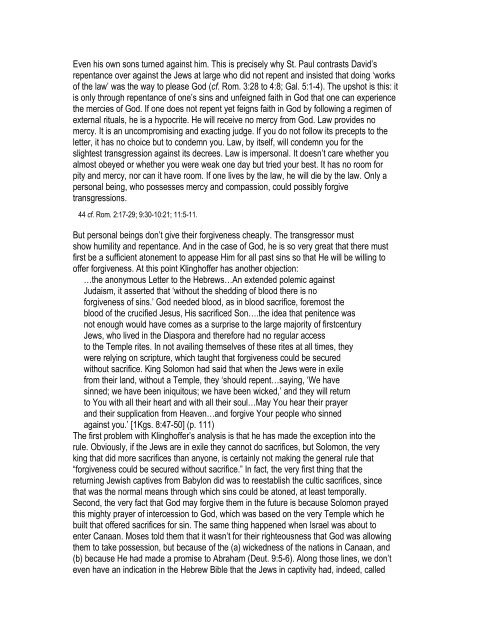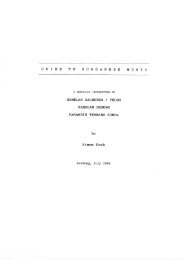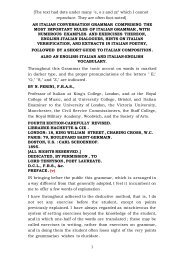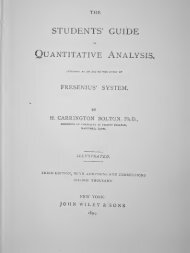Why the Jews Rejected Jesus - Free EBooks Library
Why the Jews Rejected Jesus - Free EBooks Library
Why the Jews Rejected Jesus - Free EBooks Library
Create successful ePaper yourself
Turn your PDF publications into a flip-book with our unique Google optimized e-Paper software.
Even his own sons turned against him. This is precisely why St. Paul contrasts David’s<br />
repentance over against <strong>the</strong> <strong>Jews</strong> at large who did not repent and insisted that doing ‘works<br />
of <strong>the</strong> law’ was <strong>the</strong> way to please God (cf. Rom. 3:28 to 4:8; Gal. 5:1-4). The upshot is this: it<br />
is only through repentance of one’s sins and unfeigned faith in God that one can experience<br />
<strong>the</strong> mercies of God. If one does not repent yet feigns faith in God by following a regimen of<br />
external rituals, he is a hypocrite. He will receive no mercy from God. Law provides no<br />
mercy. It is an uncompromising and exacting judge. If you do not follow its precepts to <strong>the</strong><br />
letter, it has no choice but to condemn you. Law, by itself, will condemn you for <strong>the</strong><br />
slightest transgression against its decrees. Law is impersonal. It doesn’t care whe<strong>the</strong>r you<br />
almost obeyed or whe<strong>the</strong>r you were weak one day but tried your best. It has no room for<br />
pity and mercy, nor can it have room. If one lives by <strong>the</strong> law, he will die by <strong>the</strong> law. Only a<br />
personal being, who possesses mercy and compassion, could possibly forgive<br />
transgressions.<br />
44 cf. Rom. 2:17-29; 9:30-10:21; 11:5-11.<br />
But personal beings don’t give <strong>the</strong>ir forgiveness cheaply. The transgressor must<br />
show humility and repentance. And in <strong>the</strong> case of God, he is so very great that <strong>the</strong>re must<br />
first be a sufficient atonement to appease Him for all past sins so that He will be willing to<br />
offer forgiveness. At this point Klinghoffer has ano<strong>the</strong>r objection:<br />
…<strong>the</strong> anonymous Letter to <strong>the</strong> Hebrews…An extended polemic against<br />
Judaism, it asserted that ‘without <strong>the</strong> shedding of blood <strong>the</strong>re is no<br />
forgiveness of sins.’ God needed blood, as in blood sacrifice, foremost <strong>the</strong><br />
blood of <strong>the</strong> crucified <strong>Jesus</strong>, His sacrificed Son….<strong>the</strong> idea that penitence was<br />
not enough would have comes as a surprise to <strong>the</strong> large majority of firstcentury<br />
<strong>Jews</strong>, who lived in <strong>the</strong> Diaspora and <strong>the</strong>refore had no regular access<br />
to <strong>the</strong> Temple rites. In not availing <strong>the</strong>mselves of <strong>the</strong>se rites at all times, <strong>the</strong>y<br />
were relying on scripture, which taught that forgiveness could be secured<br />
without sacrifice. King Solomon had said that when <strong>the</strong> <strong>Jews</strong> were in exile<br />
from <strong>the</strong>ir land, without a Temple, <strong>the</strong>y ‘should repent…saying, ‘We have<br />
sinned; we have been iniquitous; we have been wicked,’ and <strong>the</strong>y will return<br />
to You with all <strong>the</strong>ir heart and with all <strong>the</strong>ir soul…May You hear <strong>the</strong>ir prayer<br />
and <strong>the</strong>ir supplication from Heaven…and forgive Your people who sinned<br />
against you.’ [1Kgs. 8:47-50] (p. 111)<br />
The first problem with Klinghoffer’s analysis is that he has made <strong>the</strong> exception into <strong>the</strong><br />
rule. Obviously, if <strong>the</strong> <strong>Jews</strong> are in exile <strong>the</strong>y cannot do sacrifices, but Solomon, <strong>the</strong> very<br />
king that did more sacrifices than anyone, is certainly not making <strong>the</strong> general rule that<br />
“forgiveness could be secured without sacrifice.” In fact, <strong>the</strong> very first thing that <strong>the</strong><br />
returning Jewish captives from Babylon did was to reestablish <strong>the</strong> cultic sacrifices, since<br />
that was <strong>the</strong> normal means through which sins could be atoned, at least temporally.<br />
Second, <strong>the</strong> very fact that God may forgive <strong>the</strong>m in <strong>the</strong> future is because Solomon prayed<br />
this mighty prayer of intercession to God, which was based on <strong>the</strong> very Temple which he<br />
built that offered sacrifices for sin. The same thing happened when Israel was about to<br />
enter Canaan. Moses told <strong>the</strong>m that it wasn’t for <strong>the</strong>ir righteousness that God was allowing<br />
<strong>the</strong>m to take possession, but because of <strong>the</strong> (a) wickedness of <strong>the</strong> nations in Canaan, and<br />
(b) because He had made a promise to Abraham (Deut. 9:5-6). Along those lines, we don’t<br />
even have an indication in <strong>the</strong> Hebrew Bible that <strong>the</strong> <strong>Jews</strong> in captivity had, indeed, called








